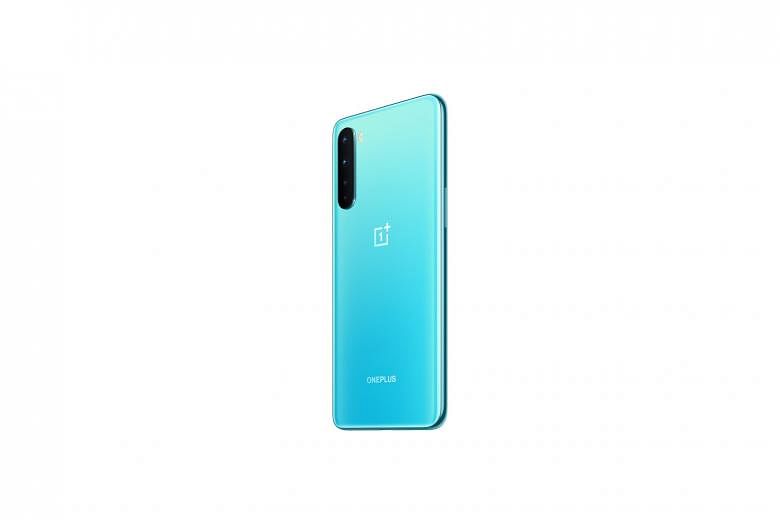The new OnePlus Nord is a solid mid-range smartphone that costs just $649 - affordable for a 5G-capable model.
It comes at a time when smartphone makers have bumped up their pricing, especially for 5G models.
OnePlus, too, has increased its prices this year. The OnePlus 8 Pro, which debuted in April, was the Chinese smartphone brand's most expensive model yet, at $1,298.
Thus, the relatively affordable Nord feels like OnePlus returning to the value-for-money approach that has defined the brand.
My first impression of the Nord is that it feels like a premium smartphone, thanks to a curved, dangerously smooth glass back and a near-bezel-less facade.
The edges of the phone have a glossy metallic finish. However, this frame is, like many cheaper phones, made of plastic and not metal.
There is also no headphone jack, while the speaker is a single downward-firing one that can be muffled by a cupped palm when holding the phone in the landscape orientation.
Despite having just 128GB of internal storage on the base model, the Nord lacks a microSD card slot for expandable storage.
But at least it retains OnePlus' distinctive alert slider - a physical toggle that lets you switch between silent, vibrate and ring modes.
I have no complaints about the Nord's in-display fingerprint sensor, which feels like one of the better ones in the market in terms of accuracy and speed.
But it took me a while to get used to the Nord's hole-punch camera cutoff, mainly because it is wider than usual in order to fit a second, ultra-wide camera for group selfies.
-
FOR
• Affordable for a 5G phone
• 90 Hz screen
• Smooth, clean user interface
AGAINST
• No headphone jack or expandable storage
• Secondary cameras feel superfluous•
SPECS
PRICE: $649
PROCESSOR: Qualcomm Snapdragon 765G (Single-core 2.3GHz, single-core 2.2GHz, hexa-core 1.8GHz)
DISPLAY: 6.44-inch Amoled, 2,400 x 1,080 pixels, 408 ppi pixel density
OPERATING SYSTEM: Oxygen OS 10.5 (Android 10)
MEMORY: 128GB, 8GB RAM
REAR CAMERAS: 48MP (f/1.8), 8MP ultra-wide (f/2.3, 119-degree), 5MP depth (f/2.4), 2MP macro (f/2.4)
FRONT CAMERAS: 32MP (f/2.5), 8MP ultra-wide (2.5, 105-degree)
BATTERY: 4,115mAh
RATING
FEATURES: 4/5
DESIGN: 4/5
PERFORMANCE: 4/5
VALUE FOR MONEY: 4.5/5
BATTERY LIFE: 5/5
OVERALL: 4/5
Despite having one more selfie camera than most smartphones, the selfie photos taken by the Nord did not impress. The ultra-wide camera is usable in a pinch, but photos had too much noise for my liking.
The image processing for the main selfie camera is also not as good as that of top-tier models. Photos with a bright light source in the background often turned out to be overexposed.
As for the rear quad camera unit, the main 48-megapixel (MP) camera appears to be of a similar grade as the one on the OnePlus 8.
Using the usual pixel-binning technique, it shoots 12MP photos that look sharp with good colour accuracy.
Its low-light mode, dubbed Nightscape, produces decent enough photos at night, albeit not as good as flagship smartphone cameras. The resulting low-light photos also exhibit a yellowish cast.
The secondary cameras are fairly mediocre. The ultra-wide camera is passable, but photos by the macro camera look soft and unfocused.
In short, the extra cameras often feel as though they are simply there to make up the numbers for OnePlus to say the Nord has a quad camera system.
Unlike its cameras, the Nord's Amoled screen is actually quite good. It is bright, colourful and supports a 90Hz refresh rate for a smoother feel when navigating the phone interface. You can still select the standard, less power-hungry 60Hz refresh rate to conserve battery life.
It also supports High Dynamic Range (HDR10) videos in the Netflix app, though the HDR effect on phones remains far inferior to the experience on a HDR television set.
Thanks to the use of the mid-range Qualcomm Snapdragon 765G processor, the Nord is one of the most affordable 5G-capable smartphone in the market. Most 5G phones use the flagship - and more expensive - Snapdragon 865 chip.
On paper, the Nord should work with sub-6GHz 5G networks, such as the one launched by StarHub last week. However, a software update may be required for the Nord before it can tap StarHub's 5G network.
The Snapdragon 765G offers more than sufficient computing power for most tasks. It may be a tad slower at opening apps but I encountered no lag while using the Nord.
It probably helps that OnePlus' Oxygen OS interface is relatively lean. It is basically stock Android 10 with a few OnePlus extras such as Parallel Apps, which lets you run two instances of messaging apps, such as Telegram, on the same device.
With the Nord's display set to run at 90Hz, it usually has about 30 per cent of its battery life left at the end of a typical work day for me.
In The Straits Times' video-loop battery test (at maximum screen brightness), the Nord clocked 14 hours and 22 minutes compared with 16 hours and 5 minutes for the Vivo X50 Pro, which also uses the Snapdragon 765G chip.
If you are not picky about the quality of smartphone photos, the OnePlus Nord offers a fluid, near-stock Android experience with nice extras, such as 5G connectivity and a 90Hz screen, at an affordable price.


